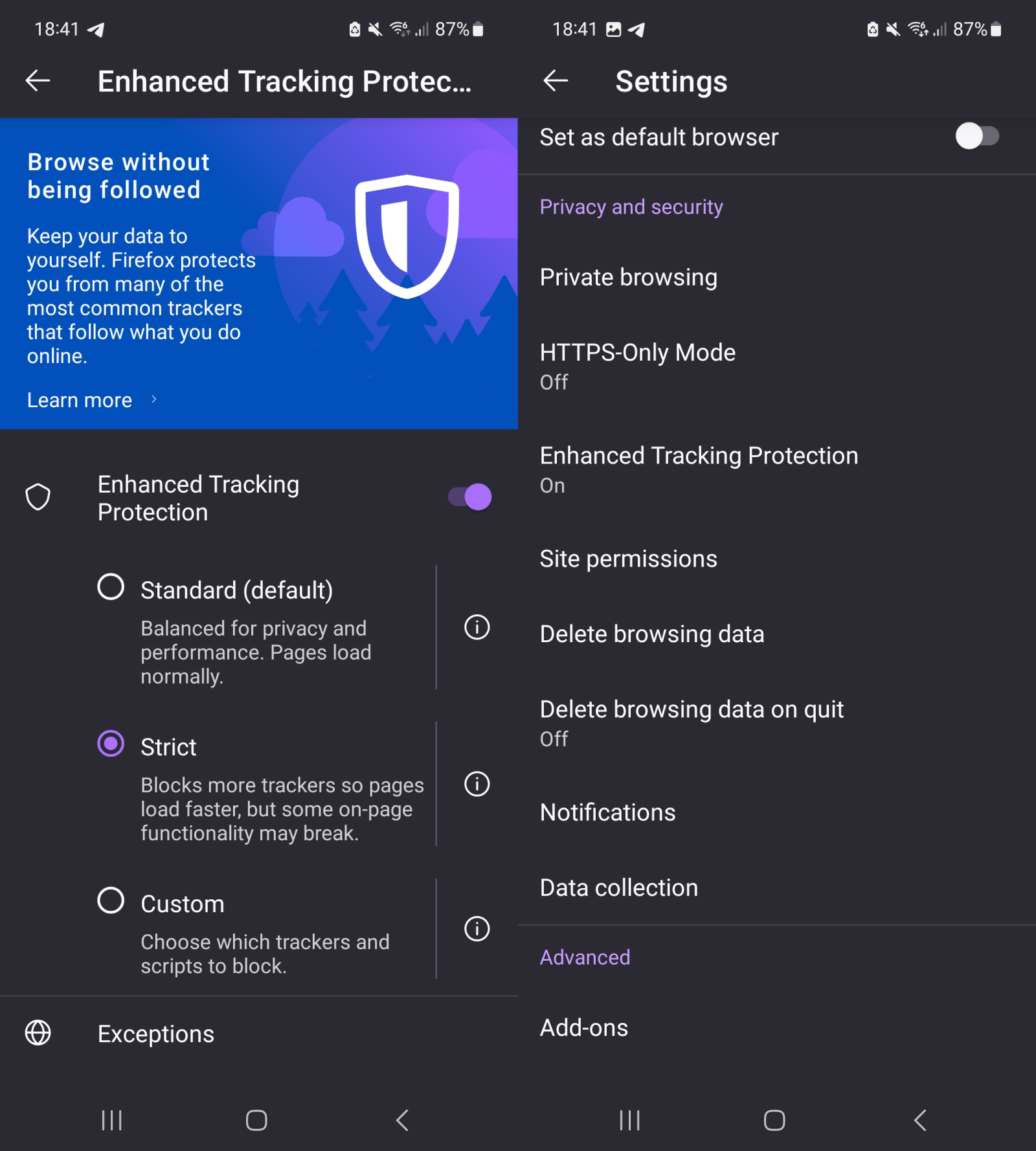Firefox for Android update enhances privacy, but you may need to enable the feature

Mozilla released a new version of Firefox for Android today alongside Firefox for the desktop. Mozilla's Firefox for Android web browser follows the same release schedule as the desktop versions, but the mobile browser's feature set is slightly different from its desktop cousins.
Firefox 111 for Android introduces support for Total Cookie Protection on Android. The feature has been a part of the desktop versions of Firefox since 2021. The privacy improvement was integrated into development editions of Firefox for Android in November 2022, and is now available in the stable Android release.
Total Cookie Protection "creates a separate cookie jar for each website" that users visit in the browser. The main idea behind the feature is to eliminate cross-site tracking. What this means is that sites may only access cookies assigned to them. Cookies are isolated, which reduces tracking, as sites can't access the bulk of cookies anymore that they used to track users across the Internet.
How to enable Total Cookie Protection in Firefox for Android

Total Cookie Protection is supported by Firefox 111 for Android or newer. The feature may not be turned on by default, as it is only supported by the browser's strict Tracking Protection mode, which is not the default mode of Firefox.
To enable the extra privacy protections in Firefox, do the following:
- Open Firefox on Android.
- Select Menu > Settings.
- Scroll down and tap on "Enhanced Tracking Protection".
- Make sure that Enhanced Tracking Protection is enabled on the page that opens.
- Switch the status from "standard (default)" to strict.
Firefox for Android will from that moment on separate cookies by domain.
Firefox users may also enable the custom mode and configure Firefox to block "all third-party cookies". This is even more effective than Firefox's Total Cookie Protection feature. The main advantage that Total Cookie Protection may offer is that very few sites may break when third-party cookies are blocked. It may still be possible to configure exceptions to allow these on select sites.
Closing Words
Firefox's Tracking Protection feature and Total Cookie Protection improve privacy, especially for users who do not block third-party cookies outright and do not use a content blocker in the browser.
Cookies may not play a large role regarding tracking in the future. Google has been working on the elimination of third-party cookies, but has postponed the major change several times so far. The company plans to roll out the change in 2024 now in its Chrome web browser.
Firefox 111 for Android fixes several security issues in the mobile browser as well. The release notes highlight that Firefox users may now open PDF documents directly in the browser, and that it made a security change to the "Open in app" feature on Android. Users need "to confirm that the request to open in app is expected", according to the release announcement.






















Utopia P2P ecosystem’s web proxy function sets the standard for private browsing. With its unparalleled level of security and anonymity, it’s the clear choice over other options like VPNs and incognito modes.
Does Firefox on Android still ship with hardcoded Google Analytics and Adjust scripts? Exodus says that it does.
I don’t know. Is Brave still promoting FTX and inserting affiliate referral codes when using cryptocurrency exchange websites? LibreWolf doesn’t
@Jek tHeY / tHeM Porkins
Yeah, some companies promote FTX by showing their logo. Some companies also promote Mr. Robot TV show by installing shady extensions via a backdoor in the browser. Some companies use affiliate links on Binance, some companies create an affiliate link from every single Google search you perform. And finally, some browsers don’t ship with hardcoded tracking scripts, while other browsers do ship with them.
Answer my question or the two of you (they / them) can go home.
Librewolf did not do any of these things. Regarding Brave, I doubt you’d be so understanding if Firefox was actively promoting scams like FTX.
@Jek tHeY / tHeM Porkins
> Librewolf did not do any of these things.
I don’t give a shit. Nobody uses that. It’s not even available on Android.
> Regarding Brave, I doubt you’d be so understanding if Firefox was actively promoting scams like FTX.
Nobody could have known that FTX was a scam without having had insider information from within the company, before it collapsed. You are looking stupid accusing Brave of promoting a “scam” of which nobody knew that it was a scam, except the higher ups of FTX itself. They removed it immediately after FTX went insolvent. You are attempting very transparent and pathetic smearing attempts here.
“…The release notes highlight that Firefox users may now open PDF documents directly in the browser”
Sounds like a good addition. Is Firefox the only browser on Android that natively opens PDF files?
Looks that way.
I think that Firefox for Android + uBlock Origin is very good for browsing. :]
Or you can just block third party cookies.
Using the words “Android” and “Privacy” in the same sentence is an oxymoron.
@Tachy
Ever heard of GrapheneOS, CalyxOS, LineageOS, smart guy?
Dame goes for “Firefox” and “privacy”.
Maybe running BSD with Lynx can be a private browsing experience.
The Danes are a proud people. There is no reason to slander them by saying they “go” for Firefox.
The Dames are a proud gender. There is no reason to slander them by saying they “go” for Firefox.
@Jek Porkins
Maybe stop thinking in absolutes…
Same*